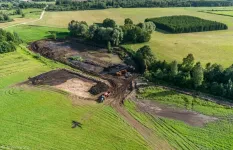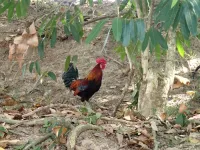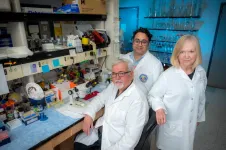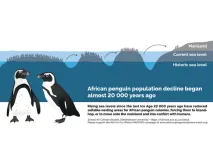(Press-News.org) Over the past two hundred years, the ocean and atmosphere have been accumulating massive amounts of carbon dioxide as factories, automobiles, airplanes, and more churn out the powerful greenhouse gas. Two articles published recently in Nature by University of Hawai‘i at Mānoa oceanographers provide a reality check on the limitations of carbon dioxide removal and a warning that marine heatwaves need clear definitions so communities can adapt.
Carbon dioxide removal is not the golden ticket
In all the scenarios assessed by the Intergovernmental Panel on Climate Change, nations around the world must dramatically and rapidly reduce their dependence on fossil fuels in order to limit global warming to 1.5–2 °C above pre-industrial levels. Further, the paths to limit warming also require the removal of carbon dioxide from the atmosphere, using methods that are still in the early stages of development.
However, David Ho, oceanography professor at the UH Mānoa School of Ocean and Earth Science and Technology (SOEST), wrote in his recent Nature article, “We must stop talking about deploying [carbon dioxide removal] as a solution today, when emissions remain high — as if it somehow replaces radical, immediate emission cuts. We have to shift the narrative as a matter of urgency.”
This is critical, he points out, over the next few years, as pressure mounts to develop technology-based climate solutions. Instead, Ho advocates for rapid decarbonization of global energy systems, especially since the effectiveness of carbon dioxide removal depends on emissions being low.
“Humanity has never removed an atmospheric pollutant at a global, continental or, even, regional scale — we have only ever shut down the source and let nature do the clearing up,” he wrote, in a warning about not relying on carbon dioxide removal in case it does not work. “We must slow the carbon clock to a crawl before we can turn it back.”
Clarifying marine heatwaves
In the same issue of Nature, Malte Stuecker and Brian Powell, professors in the SOEST Department of Oceanography, and their co-authors, all members of the U.S. NOAA Marine Ecosystem Task Force, identified the need for clearer definitions of marine heatwaves so coastal communities could adapt to these events and resource managers can better prioritize mitigation strategies.
“Clearly communicating baselines for assessing ocean warming is essential for understanding extreme events and how they will affect marine ecosystems and livelihoods in the future,” the co-authors wrote.
The researchers highlight that the term ‘marine heatwave’ is currently being used to refer to two different phenomena – short lasting extreme events and long-term warming trends. They note that the communication breakdown is “having real-world consequences” and worry that “the public might become desensitized to the real threat of marine heatwaves.”
When it comes to changes in surface ocean temperature, the authors recommend using the phrase ‘long-term temperature trends’ to describe the relatively slow changes in ocean temperature that occur over decades or longer – primarily due to anthropogenic greenhouse gasses increasing.
In contrast, they recommend only using the term ‘marine heatwave’ to describe ocean temperature changes that are transient and extremely warm relative to the expected conditions for a given place and time, as defined by an evolving, recent climatological reference period.
Finally, use of the term ‘total heat exposure’ is recommended to describe the combination of long-term warming and marine heatwaves.
The paper notes, “by adopting our suggested ocean temperature communication framework, scientists will be able to better equip marine resource decision makers to assess and prepare for risks associated with different types of ocean temperature change.”
These publications highlight the complexities and also the need for accuracy and data-driven decision-making as community members, resource managers, innovators, politicians and investors all come to the table to ensure a more stable climate path for future generations.
END
Immediate carbon cuts, common marine heatwave terminology urged
2023-04-20
ELSE PRESS RELEASES FROM THIS DATE:
Paul Hessburg receives Distinguished Landscape Ecologist Award
2023-04-20
Paul Hessburg received the International Association for Landscape Ecology-North America Chapter’s 2023 Distinguished Landscape Ecologist Award. The annual award recognizes major scientific contributions to landscape ecology, honors scientists who have played a pivotal role in shaping the field, and is the organization’s highest honor.
Hessburg is a senior research ecologist with the USDA Forest Service's Pacific Northwest Research Station based at the Wenatchee Forestry Sciences Laboratory. He was honored for a highly diverse career that has "greatly enhanced the capacity of landscape practitioners to develop strategies and ...
Cut council tax for green gardeners to help cities tackle climate change
2023-04-20
Homeowners should be rewarded to garden sustainably, new research by Professor of Environmental Horticulture at University of Sheffield, recommends
Rewards for sustainable gardening could include reductions to council tax, water bills or assistance with resources
Ensuring urban gardeners have the ability to have planted gardens will have numerous benefits for the environment and communities
Banning environmentally damaging materials, such as pesticides; or practices such as installing astroturf, could also benefit the environment
Research shows that some cities may have lost as much as 50 per cent of their green garden space over the last ...
Online tool found to be effective at assessing dementia risk
2023-04-20
Researchers at UNSW Sydney and Neuroscience Research Australia (NeuRA) have developed and evaluated a tool for assessing dementia risk, with promising initial results.
Currently, over 55 million people are living with dementia around the world, with that number set to increase to 78 million by 2030, and the focus on dementia research increasingly shifting towards prevention.
The online tool takes approximately 20 minutes to complete and provides a personalised dementia risk report that patients can discuss with their doctor.
Since developing the risk tool – known as CogDRisk – in 2022, the team has been evaluating the success of the tool, by trialling it on four existing datasets, ...
A myth no more: Cranberry products can prevent urinary tract infections for women
2023-04-20
Drinking cranberry juice has long been a mythical prevention strategy for women who develop a urinary tract infection – and new medical evidence shows consuming cranberry products is an effective way to prevent a UTI before it gets started.
A global study looking at the benefits of cranberry products published in Cochrane Reviews has determined cranberry juice, and its supplements, reduce the risk of repeat symptomatic UTIs in women by more than a quarter, in children by more than half, and in people susceptible to UTI following medical interventions by about ...
Recycling lake sediments for crop production: A sustainable solution for closing the phosphorus cycle
2023-04-20
A four-year field experiment conducted on the shores of restored Lake Mustijärv in Viljandi, Estonia, has revealed that recycling phosphorus-rich lake sediments back to agriculture could have positive impacts on crop production.
The study was conducted by doctoral researcher Mina Kiani and the AgriChar research group, and it is globally the first of its kind to cover the environmental aspects of recycling lake sediments to agriculture over several years. Kiani defends her thesis on 21 April at the University of Helsinki Faculty of Agriculture and Forestry.
The study aimed to find a sustainable solution for closing the leaking agricultural phosphorus (P) cycle by recycling P-rich ...
Chicken breeding in Japan dates back to fourth century BCE
2023-04-20
Conclusive evidence of chicken breeding in the Yayoi period of Japan has been discovered from the Karako-Kagi site.
The chicken is one of the most common domesticated animals, with a current estimated population of over 33 billion individuals. They are reared for their meat and eggs, and may be kept as pets.
The chicken is believed to have been domesticated in Southeast Asia about 3500 years ago, following which they were carried to all corners of the world. The exact date of introduction of chicken breeding to Japan is under debate, as there are no historical records and archeological evidence ...
Protecting the vision of premature babies
2023-04-20
AUGUSTA, Ga. (April 20, 2023) – In the spiraling cycle that can lead to vision loss in premature newborns, Medical College of Georgia scientists have found a new target and drug that together appear to stop the destruction in its tracks.
In babies, the development of the blood vessels of the retina should be complete by birth. But with preterm birth, the still-immature retina can develop a potentially blinding eye disorder known as retinopathy of prematurity.
When premature babies transition from inside the womb, where ...
African penguins: climate refugees from a distant past?
2023-04-20
Imagine the view from the western coastline of southern Africa during the Last Glacial Maximum (LGM) over twenty thousand years ago: in the distance you would see at least fifteen large islands – the largest 300 square kilometres in area – swarming with hundreds of millions of marine birds and penguin colonies.
Now imagine sea levels rising up to a hundred metres between fifteen to seven thousand years ago, gradually covering these large islands until only small hill tops and outcrops remained above water. Over the past 22 000 years this resulted in a tenfold ...
New study challenges the idea that early Parkinson’s Disease causes cognitive dysfunction
2023-04-19
Like many neurodegenerative diseases, Parkinson’s disease (PD) is a thief that hacks into human operating systems and corrupts their cognitive hard drives until they can no longer control their movements or perform activities of daily living.
Often, in its later stages, Parkinson’s disease steals data too, leading to memory loss, confusion and dementia.
Both the cause and cure of Parkinson’s disease remain elusive, but research has helped afflicted individuals manage their symptoms and lead healthier post-diagnosis lives. Individuals diagnosed with Parkinson’s ...
Fighting a national nursing faculty shortage
2023-04-19
Last year, nursing schools across the country were forced to turn away more than 90,000 qualified applicants. The reason: a lack of faculty members to teach them and clinical sites to train them.
A team of University of Texas at Arlington faculty led by Ann Eckhardt, clinical associate professor and interim chair of graduate nursing programs in the College of Nursing and Health Innovation (CONHI), received a state grant to help reverse that trend and increase the pool of nursing faculty, preceptors and simulation coordinators.
“There ...





